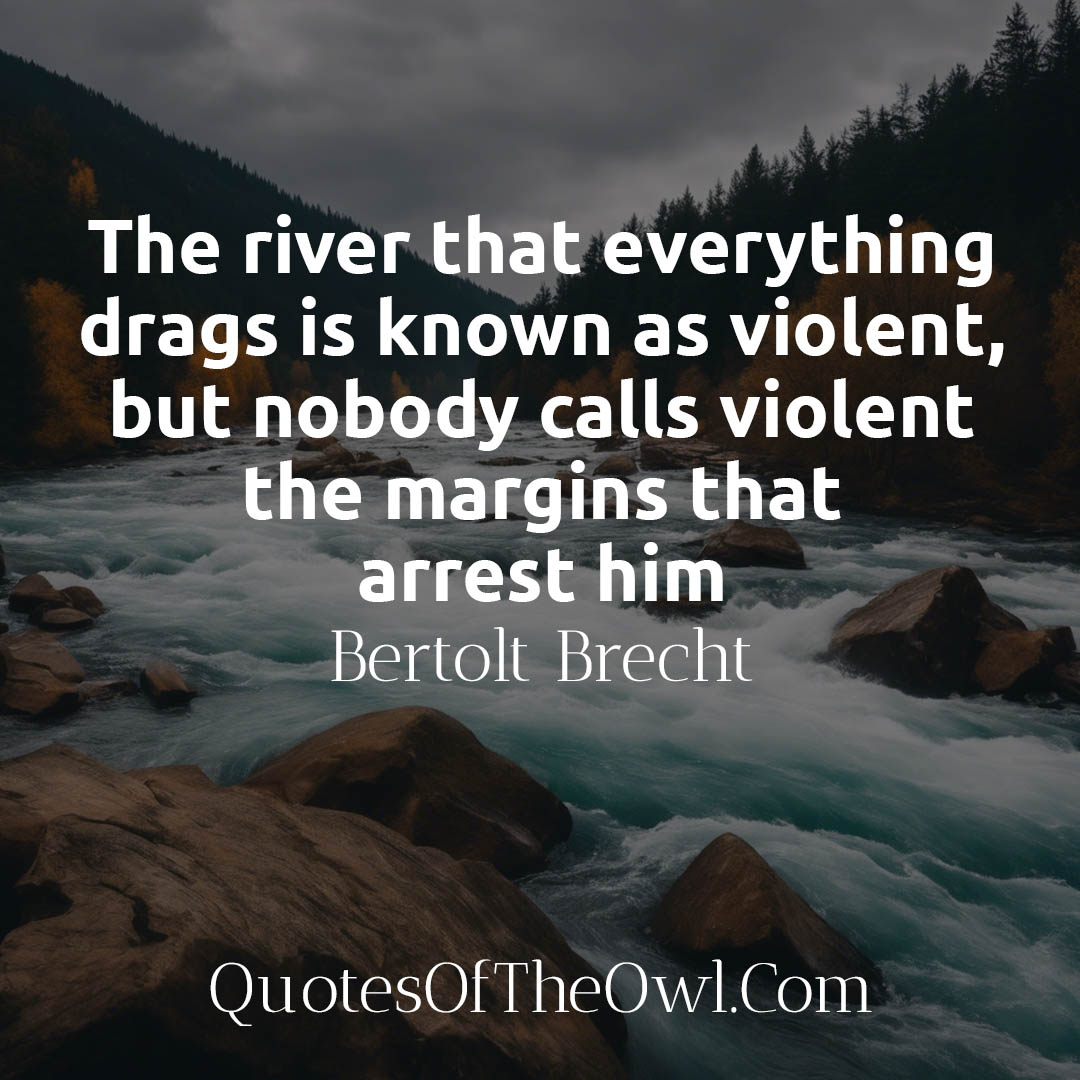The river that everything drags is known as violent, but nobody calls violent the margins that arrest him. – Bertolt Brecht
Bertolt Brecht, a renowned playwright and poet, once uttered a profound statement: “The river that everything drags is known as violent, but nobody calls violent the margins that arrest him.” This quote encapsulates a deep insight into human perception and societal norms, inviting us to contemplate the nature of violence and the role of stillness in our lives.
Understanding the Metaphorical Meaning
At first glance, Brecht’s quote seems to refer to the relentless force of a river, sweeping everything in its path. However, upon closer examination, it reveals a metaphorical exploration of power dynamics and societal values.
Significance of Rivers in Human Culture
Throughout history, rivers have held immense significance in human culture, serving as sources of sustenance, transportation, and inspiration. They are often depicted in literature, art, and religion as symbols of life, renewal, and continuity.
Rivers as Symbols of Power and Force
In many narratives, rivers are portrayed as forces of nature, capable of both nurturing and destroying. Their currents represent the unstoppable march of time and the relentless force of natural phenomena.
Contrasting Perspectives: Violence vs. Stillness
While the mainstream perception may label the river as violent due to its tumultuous nature, Brecht challenges us to reconsider our perspective. He directs our attention to the margins, where stillness prevails, and where the river’s power is contained.
Exploring the Concept of Margins
The margins, often overlooked and undervalued, serve as boundaries that resist the river’s force. They represent stability, resistance, and resilience in the face of chaos.
Margins as Symbols of Resistance and Resilience
In societal contexts, margins can be interpreted as spaces occupied by marginalized communities or individuals. Despite facing oppression and neglect, these margins serve as sites of resistance and resilience, challenging dominant narratives and ideologies.
Analyzing the Societal Implications
Brecht’s quote prompts us to examine the societal norms that glorify power and overlook the quieter virtues of stillness and restraint. It urges us to question the labeling of certain behaviors or entities as violent while disregarding the underlying structures that perpetuate violence.
The Relevance of Brecht’s Quote in Contemporary Society
In today’s fast-paced world, where chaos often reigns supreme, Brecht’s insight holds profound relevance. It encourages us to pause and reflect on the forces that shape our lives and societies, inviting us to embrace moments of stillness amidst the turmoil.
Examples from Literature and History
Throughout literature and history, we encounter numerous examples that echo Brecht’s sentiment. From the quiet resistance of marginalized communities to the subtle acts of defiance against oppressive regimes, the margins play a crucial role in shaping the course of events.
Environmental Interpretation: The Impact on Ecosystems
Applying Brecht’s quote to environmental contexts, we see how human interventions disrupt natural ecosystems, often with devastating consequences. By harnessing the power of rivers for economic gain, we risk disregarding the delicate balance that sustains life on Earth.
Human Intervention and the Disruption of Natural Margins
The relentless pursuit of progress often leads to the exploitation of natural resources, disregarding the boundaries that regulate ecological processes. In doing so, we inadvertently contribute to the erosion of margins and the destabilization of ecosystems.
Reflecting on the Consequences
As we reflect on Brecht’s quote, we are reminded of the interconnectedness of all things and the importance of finding harmony between opposing forces. By acknowledging the significance of margins, we can cultivate a deeper appreciation for stillness and balance in our lives and societies.
Conclusion: Embracing Stillness Amidst Chaos
In conclusion, Bertolt Brecht’s quote serves as a poignant reminder of the complexities of power and violence in human societies. It challenges us to look beyond surface appearances and recognize the quiet strength of those who resist the currents of chaos. By embracing stillness amidst the turbulence of life, we can find greater meaning and purpose in our journey.
Discover the profound wisdom of Bertolt Brecht through his powerful quotes

